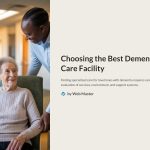 In recent years, the demand for specialized dementia care services has surged due to the rapid increase in elderly populations and the prevalence of Alzheimer’s and other related conditions. Choosing the right nursing hospital for dementia patients is no longer just a matter of location or cost—it’s about safety, specialized programs, personalized care, and long-term satisfaction for both patients and their families. In 2025, the criteria for evaluating dementia care facilities have evolved significantly. Institutions are now being compared not only by their medical care quality but also by their ability to provide compassionate, engaging, and secure environments. Emerging trends such as memory-stimulation therapy, family-inclusive care plans, and AI-assisted monitoring are reshaping the landscape. Let’s dive deep into a comprehensive comparison to help you make an informed decision, ensuring your loved one gets the best care possible while you gain peace of mind.
In recent years, the demand for specialized dementia care services has surged due to the rapid increase in elderly populations and the prevalence of Alzheimer’s and other related conditions. Choosing the right nursing hospital for dementia patients is no longer just a matter of location or cost—it’s about safety, specialized programs, personalized care, and long-term satisfaction for both patients and their families. In 2025, the criteria for evaluating dementia care facilities have evolved significantly. Institutions are now being compared not only by their medical care quality but also by their ability to provide compassionate, engaging, and secure environments. Emerging trends such as memory-stimulation therapy, family-inclusive care plans, and AI-assisted monitoring are reshaping the landscape. Let’s dive deep into a comprehensive comparison to help you make an informed decision, ensuring your loved one gets the best care possible while you gain peace of mind.

Understanding the Core Services Offered by Dementia Care Facilities
When comparing dementia care hospitals, it’s essential to start with the core services they provide. Most high-quality institutions will offer 24/7 medical supervision, assistance with daily living activities, medication management, and specialized therapies aimed at memory retention and cognitive engagement. These include music therapy, art programs, and physical activities designed specifically for dementia patients.
Some facilities take an innovative approach by integrating holistic wellness practices such as aromatherapy, pet-assisted therapy, and garden therapy to enhance the emotional well-being of their residents. The availability of neurologists and geriatric psychiatrists on staff also greatly enhances the quality of care.
Additionally, the staff-to-patient ratio can directly affect the quality of service. Look for facilities with well-trained caregivers who have undergone dementia-specific training. Facilities that allow continuous caregiver education tend to perform better in long-term patient satisfaction surveys.
Check Official Service Standards

Comparing Facility Types: Specialized Hospitals vs General Nursing Homes
Not all facilities are created equal. Specialized dementia hospitals often outperform general nursing homes in terms of tailored services. These institutions are typically equipped with secured environments, dementia-focused staff training, and customized activity plans to reduce confusion and agitation in patients.
In contrast, general nursing homes might offer basic supervision and assistance but may lack the depth of experience or equipment necessary to handle mid-to-late-stage dementia complications. This includes managing aggressive behavior, night wandering, or severe memory lapses.
An important factor to consider is how each type of facility integrates family members into care planning. Specialized centers tend to offer regular update meetings, caregiver counseling, and workshops for families, while general facilities may focus more on routine physical health checkups.
Explore Dementia-Specific Facilities

Evaluating Cost Structures and Insurance Coverage
The financial aspect of dementia care is one of the most daunting challenges for families. Monthly costs can range widely depending on the level of care, location, and type of facility. Specialized dementia hospitals often charge higher fees due to the need for highly trained staff and secured infrastructure.
However, some countries and regions provide substantial public insurance coverage or subsidies. It’s vital to investigate what part of the cost is covered by national health insurance, long-term care insurance, or private insurance policies.
Compare facilities based on their pricing transparency. A good facility will offer a clear breakdown of costs, including services covered, optional programs, and what additional fees may arise. Avoid institutions that are vague or evasive about their billing procedures.
Understand Financial Aid Options

The Role of Technology in Modern Dementia Care
Advanced technologies are revolutionizing dementia care. Facilities are now incorporating AI-based monitoring systems, GPS tracking bracelets, and telemedicine platforms that connect patients to specialists without requiring travel.
Additionally, cognitive stimulation apps and interactive tools are being used to support memory, attention, and problem-solving skills. Virtual reality (VR) therapy has shown positive effects in calming agitated patients and providing immersive therapeutic experiences.
When comparing facilities, inquire about their technology stack: do they use fall detection systems? Are medical records digitized and easily accessible to family members? Does the facility use behavioral monitoring software to customize care?

Family Engagement and Emotional Support Systems
A dementia care plan isn’t complete without considering the emotional needs of the patient and their family. Look for facilities that host regular family days, offer mental health counseling, and provide emotional support for caregivers.
Facilities that include families in decision-making processes often yield better outcomes. Communication channels such as family portals, real-time chat with staff, and progress reports help build trust and transparency.
Moreover, patient happiness often correlates strongly with their emotional stability. Centers that encourage community interaction, peer support groups, and personalized hobbies lead to fewer depressive symptoms and reduced patient aggression.
See Caregiver Support Resources

Final Checklist: Choosing the Right Dementia Care Hospital
To simplify the decision-making process, here’s a quick checklist when comparing dementia care hospitals:
- Do they specialize in dementia care or are they a general facility?
- Is the environment secure and designed for dementia safety?
- Are care plans personalized and updated regularly?
- How transparent is their cost structure?
- What role does technology play in their daily care routines?
- How actively are families involved in care planning?
- Are emotional and mental health services provided for both patients and families?
- What do reviews and testimonials say?
Visit the facility in person if possible, speak to current residents’ families, and always request the latest inspection or certification reports before making a commitment.
*Capturing unauthorized images is prohibited*



